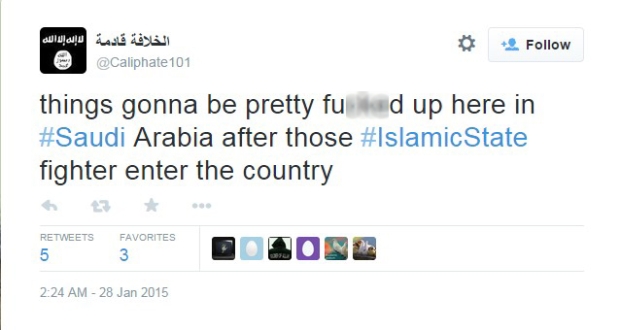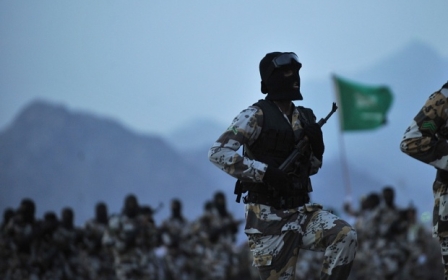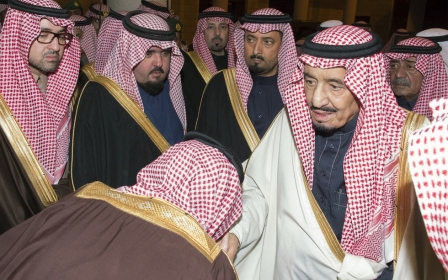'Tens' of IS militants infiltrate Saudi Arabia after border attack: Blogger

A well-known Saudi blogger has reported that “tens” of Islamic State militants were able to infiltrate Saudi Arabia after a late-night attack on a border post on Tuesday.
A Twitter account, run under the handle Mujtahidd, alleged that IS fighters led an attack at the country’s northern border with Iraq, near the town of Rafha.
As of late Wednesday, Saudi authorities had not commented on the claims.
In a string of tweets published on Wednesday morning the user, who has more than a million followers and is known for posting anti-establishment news from within Saudi Arabia, said that security services were left in a state of “confusion” after the attack, which was apparently supported by a “cell” from within Saudi Arabia.
Translation: The Interior Ministry has revealed information about the entry of tens of IS fighters through a post near Rafha – they succeeded in disappearing within Saudi Arabia. It has not been possible to catch up with them yet.
Translation: Details: The border guards were attacked by a group that advanced from Iraq, supported by a cell from inside [Saudi Arabia]. The guards ran away, and the two groups [of militants] melted away in the suburbs of Rafha.
Translation: This is the reason for the deployment that has been seen in the area around Rafha. Military, security and intelligence services took part in combing the area.
The user has not previously been known for expressing pro-Islamic State sentiments, but frequently claims to leak damaging information from within the Saudi government.
Fears of support for IS within Saudi Arabia
Reports about Tuesday night's alleged attack were echoed by Twitter accounts supportive of IS, of which more than 45,000 were created in the autumn of 2014.
One of these accounts posted the news on Tuesday night, claiming to be operating from within Saudi Arabia.
A commenter on Al Platform Media, a blog describing itself as the “jihadi media platform” and known for hosting IS supporters, said the militants had targeted a stronghold of the Shammar tribe, “known for its historical enmity to the Saudi royal family”.
The commenter, a prolific user of the site, alleged that the attack had been “well planned” by the tribe from within Saudi Arabia.
A US official said this week that at least 70 percent of IS leadership hails from Iraq, Saudi Arabia’s neighbour to the north, and that they were incarcerated in US-run prisons during the 2003-2011 occupation.
Saudi Arabia is on high alert at the possibility of spillover from the chaos in Iraq – plans were recently announced for the building of a 960-kilometre wall to shield itself from the IS threat.
However, authorities also fear the presence of support for the group within the nation’s population of nearly 29 million.
The second-largest number of foreigners fighting alongside Islamic State in Iraq and Syria is thought to come from Saudi Arabia.
Saudi Arabia’s borders were targeted by IS militants at the start of this month – four gunmen armed with hand grenades, pistols and explosive belts killed three soldiers, including a senior commander.
It was later confirmed that three of the four attackers were Saudi nationals.
The attack happened in the Northern Borders Province, the same area as Tuesday night’s alleged attack.
Sajad Jiyad, an Iraq expert and director of research at the thinktank Integrity, told MEE that Tuesday’s infiltration is “likely” to be credible, partly because the 5 January attack shows that IS has begun focusing its energies on Saudi Arabia.
“There has been no official confirmation yet, so it remains an unsubstantiated report, but I think an incident like this is likely, partly because something similar like this occurred a few weeks ago," Jiyad said. “It shows that [IS] is able to show an operational presence in Saudi Arabia – this is an important recruitment tool."
“The timing is interesting – the group's homegrown support [wthin Saudi Arabia] will increasingly come to the fore during this period in which the new King takes over the reins of power," he said.
Charlie Winter, a researcher at anti-extremism thinktank Quilliam Foundation, agreed that the timing of the claim could be linked to instability surrounding royal succession in oil-giant Saudi Arabia.
“In the wake of King Abdullah’s death, it would make sense for IS to try and destabilise them in this way, whether [by launching] an incursion or whether just by disseminating rumours to scare people,” Winter told Newsweek.
In the wake of the 5 January attack, the anti-extremist thinktank Soufan Group warned that IS was hoping to “capitalise” on instability in Saudi Arabia and “recruit more support among the general population”.
However, other analysts have suggested that the timing of the claim is also significant in the context of setbacks the militant group faced in Kobane, the Kurdish Syrian town that was “liberated” from IS control earlier this week.
Torbjorn Soltvedt, an analyst at risk analysis firm Verisk Maplecroft, said the claim could be a way for IS to “maintain some momentum” in the wake of the loss of Kobane.
“An audacious attack on the Saudi border would be a propaganda coup for them."
Middle East Eye propose une couverture et une analyse indépendantes et incomparables du Moyen-Orient, de l’Afrique du Nord et d’autres régions du monde. Pour en savoir plus sur la reprise de ce contenu et les frais qui s’appliquent, veuillez remplir ce formulaire [en anglais]. Pour en savoir plus sur MEE, cliquez ici [en anglais].






